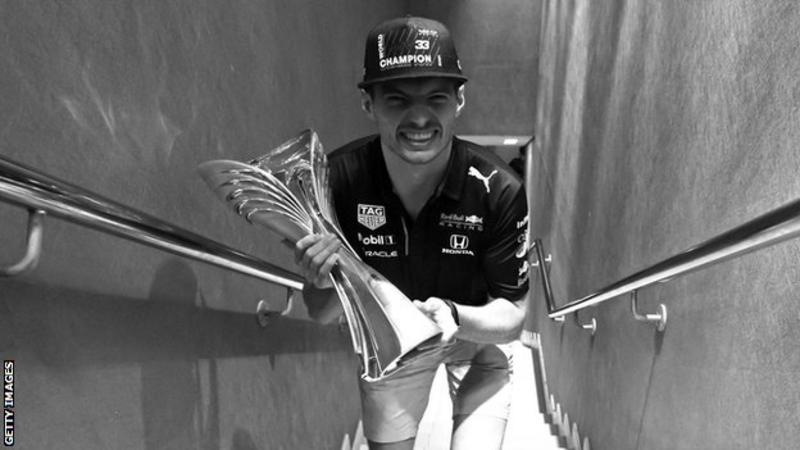
By Andrew Benson, F1 Writer
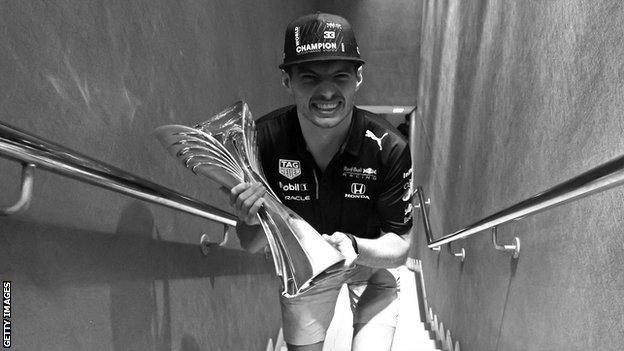
As Max Verstappen battled the torrent of emotions coursing through him after winning his first Formula 1 world title, one word kept kept coming to his lips: “Insane.”
It seemed an appropriate way to describe not only a remarkable see-sawing race, in which Lewis Hamilton seemed on course to win an eighth world title only to have it wrenched from his grasp in highly contentious circumstances right at the end, but the whole 2021 championship itself.
Abu Dhabi, a circuit renowned for producing soporific grands prix over the years, served up a race brimming with controversy, in which the rancour and ill-feeling that has grown between the Mercedes and Red Bull teams spilled over both during the race and after it.
The race ended with intense controversy – about whether the rules had been correctly followed when it was restarted for one final racing lap with Hamilton a sitting duck on old tyres, a lap that turned the world championship upside down.
Hamilton in control – and then a twist
It was a bad-tempered way to end what had become an increasingly bad-tempered season.
There was another aggressive overtaking move by Verstappen on the first lap that led to more controversy. Hamilton went off track to avoid him as the Dutchman dived deep into the first chicane, but the Briton was allowed to keep the position.
Red Bull complained about that, but race director Michael Masi shrugged them off, saying Verstappen had forced Hamilton off the track and any advantage gained had been given back.
As the race developed it became increasingly apparent that Hamilton had far too much pace for Verstappen to have any hope of catching up again in a straight fight.
A virtual safety car gave Red Bull hope, allowing them a free pit stop for fresher tyres. But it made little difference – the gap between Hamilton and Verstappen merely stabilised rather than growing every lap, and Hamilton appeared to be driving to the title.
But then Williams’ Nicholas Latifi crashed with five laps to go. A safety car was deployed and Verstappen pitted again for fresh tyres.
Mercedes dared not. If Hamilton had stopped, it would have cost them the lead, as Verstappen, behind him, would almost certainly have stayed out. Verstappen’s tyres were still relatively fresh after his second pit stop and the idea of trying pass him with the title on the line and knowing that if both cars crashed out Verstappen would be champion understandably did not appeal.
Hamilton would most likely not have been able to get by again. Plus, it was far from clear that the race would restart. Mercedes had no choice but to hang on in front and hope for the best.
Hamilton immediately realised the potential consequences – if the race restarted he would be a sitting duck on old tyres with Verstappen right behind him on fresh ones.
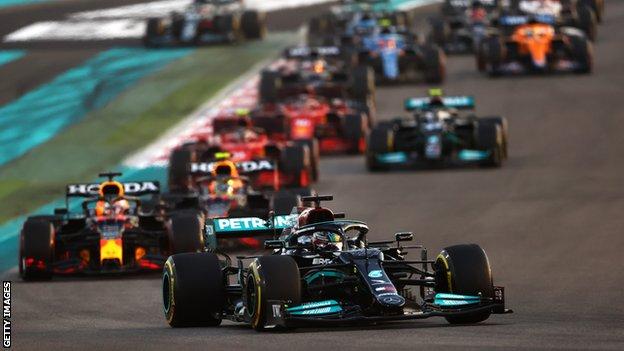
The questions over the rules
What followed was unprecedented.
Race director Michael Masi initially said lapped cars would not be allowed to overtake, which would have left five cars between Hamilton and Verstappen for the one lap of racing that it looked like would be left.
That’s against normal protocol, so Red Bull complained.
Masi changed his mind and let those five cars overtake – but not the other three. This put Verstappen and Hamilton together but left two lapped cars between third-placed Carlos Sainz’s Ferrari and Verstappen and one between Valtteri Bottas’ Mercedes and Yuki Tsunoda’s Alpha Tauri.
This is also against normal protocol. So Mercedes complained, to no avail.
The race was restarted with one lap to go and the inevitable happened. Verstappen, with so much extra grip, passed Hamilton into Turn Five. Hamilton tried to get him back down the two subsequent straights, but was never likely to.
The world championship had changed hands – as a result of a questionable call from the race director.
George Russell, a Mercedes driver next year, said: “Max is an absolutely fantastic driver who has had an incredible season and I have nothing but huge respect for him, but what just happened is absolutely unacceptable. I cannot believe what we’ve just seen.”
Verstappen obviously expressed the opposing view. “Everything [on track] was clear,” he said, “so why would you do another lap behind the safety car?”
Disinterested observers – drivers and team members – were baffled. What happened is not the way things are normally dealt with, and one driver told BBC Sport he believed that had this been any other race, it would simply have ended behind the safety car.
The problem is the rule that deals with allowing lapped cars to overtake leaves room for manoeuvre. It says: “If the clerk of the course considers it safe to do so, and the message ‘lapped cars may now overtake’ has been sent to all competitors, any cars that have been lapped by the leader will be required to pass the cars on the lead lap and the safety car.”
But that message was not displayed, a different one was, ordering only some cars through, and this eventuality is not in the regulations.
However, Masi had acted contrary to another part of the same article, 48.12 of the sporting regulations.
This says: “Once the last lapped car has passed the leader, the safety car will return to the pits at the end of the following lap.”
But that’s not what happened – the following lap was the last lap, and the cars were released to race at the start of it, when the rules appear to say they should not have been.
There’s another rule that says the race director shall have “overriding authority” on a number of matters, including the safety car.
The stewards used this as part of their justification for throwing out Mercedes’ appeal after the race. But does the rule mean Masi can decide to do whatever he wants in such situations, or that he has the ultimate authority in the correct application of the rules?
The stewards’ other argument for rejecting the protest was that article 48.13 – the very next clause – overrules 48.12 because it says: “Once the message ‘safety car in this lap’ has been displayed, it is mandatory to withdraw the safety car at the end of that lap.”
This seems to suggest the FIA’s own rules regarding the safety car contradict themselves.
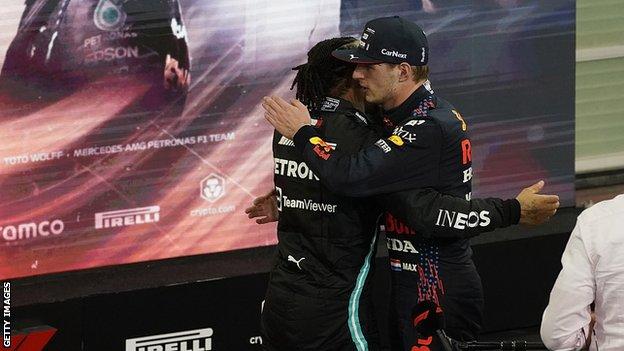
What happens next?
Questions will be asked about the way the race was handled, and it is hard to imagine there will not be some serious fall-out.
At the start of the weekend, Verstappen complained he was being treated differently from other drivers – highlighting what he said was inconsistency of decision-making.
The specific examples he used were not really relevant, but there undoubtedly has been inconsistency this year with regard to stewarding decisions, especially around Verstappen.
He was not penalised, for example, for forcing Hamilton off the track in Brazil – a decision many drivers felt was wrong, and told Masi so – but was for a similar incident in Saudi Arabia.
Masi’s actions have come under the spotlight for other reasons this year – most notably the decision to run the Belgian Grand Prix for two laps behind the safety car after hours of delay because of rain and then call a result.
Privately, a number of teams have had concerns about the way in which he has conducted himself. After Saudi Arabia, Red Bull team boss Christian Horner went public with them, saying that F1 was missing the late FIA F1 director Charlie Whiting. Race director was one of his roles, and Masi assumed it when Whiting died on the eve of the 2019 season.
And now one of Masi’s decisions has changed the outcome of the world championship. Not only that, but many will have questions about the way he talked to Mercedes F1 boss Toto Wolff when he complained over the radio immediately after the flag.
“It’s called a motor race, Toto,” he said. Some senior figures were aghast at the manner and content of that remark.
The credibility of the entire sport and of the FIA is at stake here. There is an FIA presidential election on Friday, between candidates Mohammed bin Sulayem of the United Arab Emirates and Englishman Graham Stoker. What will Jean Todt’s successor make of all this?
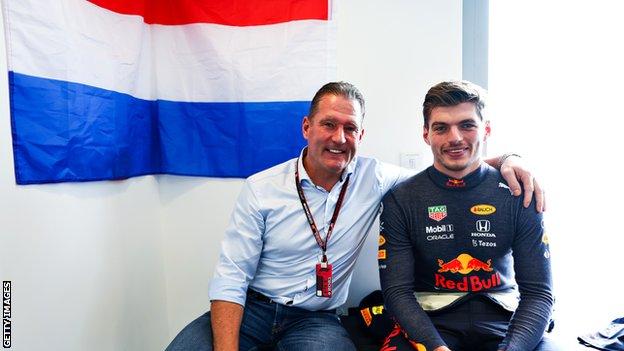
Verstappen a deserving champion
Whatever anyone might feel about the decisions that were made during the race, there is an important truth about the 2021 Formula 1 World Championship.
There could have been no wrong world champion this year. Verstappen and Hamilton have driven two of the most impressive seasons F1 has ever seen, sustained one of the most intense, hard-fought battles in sporting history over 22 grands prix, and been head and shoulders – and a lot more – clear of every other driver on the grid. The season has captivated people across the world.
One of them had to win in the end. But whichever way the title decider in Abu Dhabi had gone, the winner would have been one of the all-time great champions at the end of one of the all-time great seasons.
“In general the quality has been very high, set by myself and Lewis of course,” Verstappen said. “We have been pushing each other to the limit every single time. Some tough races physically as well, pushing flat out all the time, no lap to rest.
“And during the whole weekend, qualifying and race, it was so important to always try and be perfect, which is very hard. Because a tiny lock-up can make the difference between P1 or P2 and in the championship battle we had that was massive. The level of focus required was very high.
“It’s been an incredible season. In general, we have really enjoyed it. We had our moments but in a championship battle that is part of it. Now the season is over, we can relax a little more about it. But it has been tense. Every race we have been pushing each other to the limit and that is just really nice to see.
“New experiences and I learned more about myself, in a positive way luckily. Clearly you keep on improving.
“There was criticism or whatever but these moments teach you that you keep believing in yourself and in your own beliefs. And be a strong person about it.
“I have a lot of respect for Lewis, but I am just very happy that I won in general because it has been a very tough season fighting against Mercedes and Lewis.
“I don’t want to sound arrogant or whatever to say it’s a great satisfaction to win against him. I just have a lot of respect for him as a driver. He is an amazing driver in terms of what he has achieved.
“I have achieved everything in F1 now and anything that comes next is just a bonus.”
For Verstappen, it marked the realisation of a lifetime’s ambition, and of work that started with his father, the former F1 driver Jos Verstappen, when he was just four years old.
Jos devoted his life to making Max world champion. They toured Europe’s karting tracks together in a van. There were tough times – Jos once left behind Max at a fuel station for a while to teach him a lesson after a disappointing race weekend – but from very early on it was clear Max was a phenomenon, and he has been proving it ever since.
Jos was in Abu Dhabi this weekend, along with other people close to Max, and he was overwhelmed afterwards.
“My dad was very emotional,” Max said. “Growing up, working for that goal, you have achieved it. It was truly incredible.
“It all flashes though your head now, especially with my dad travelling through the whole of Europe for that one goal, first to be in F1, to win a race and hear the national anthem, and the ultimate goal was to win the world championship. It was very difficult. But now it happened, it’s insane.”
That word again.







